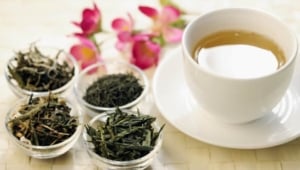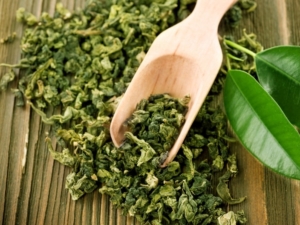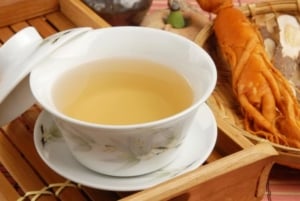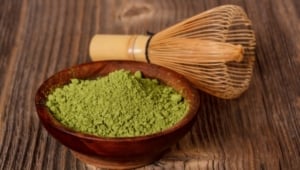Green Tea: 8 Health Benefits + 5 Possible Side Effects

Green tea is a variety of tea that has a centuries-old tradition in Asia, especially in Japan and China. There are many myths surrounding this healthy hot beverage in these countries . It is said to help you lose weight, detoxify the body, and fight cancer. Now let us enlighten you about this popular type of tea.
Many people love green tea for its invigorating effects. The hot beverage also has many other health benefits. Read on to find out what green tea does for you and what you need to keep in mind when preparing it.
What Green Tea Is

What green tea is
Especially in China and Japan, green tea has been a tradition for thousands of years. In the meantime, the tea variety has also become a popular drink in many countries and has taken its place in our in everyday lives.
Many people drink the stimulating tea instead of coffee or as a milder variant to black tea.
Like black tea, green tea is made from the leaves of Camellia sinensis plant. However, instead of fermenting the leaves, green tea is directly dried and roasted or steamed. This prevents oxidation and keeps the leaves extra green.
In addition, many secondary plant substances are also preserved in this way, which contribute to the health benefits of the tea.
Varieties of Green Tea
Although one and the same plant is always used, there are numerous varieties of green tea. The different flavors and ingredients depend on the processing and cultivation. Popular varieties include:
Sencha Green Tea
Sencha is a popular green tea from Japan. It is grown there in particularly large quantities under direct sunlight and captivates with its distinctive taste.
Matcha Green Tea
Also from Japan, Matcha tea is a beverage made from Tencha or Gyokuro tea. The dried leaves are ground into a fine powder, which is then poured over hot water and whipped until frothy.
The taste of matcha is quite intense and for many people, takes some time to get used to. However, the drink contains quite a lot of health-promoting substances and antioxidants.
Bancha Green Tea
Bancha is quite similar to Sencha tea, but of lower quality. The tea leaves that are used to make Bancha come from the same plant as Sencha. The leaves used for Bancha are picked after the Sencha leaves are plucked. Because it has very little caffeine, bancha is also popular with children in Japan.
Gyokuro Green Tea
Gyokuro is a high-quality green tea with a mild taste. Because the plants are kept in the shade for three weeks, there is little bitterness in the leaves. However, the quality of the tea is also reflected in the price. Gyokuro is one of the most expensive green teas in the world.
Originally, the tea comes from China. It was not until the 8th century that green tea was brought to Japan by Buddhist monks.
Healthy Ingredients in Green Tea

Healthy ingredients in green tea
Green tea contains numerous health-promoting substances that are said to help with many ailments. Tea is considered a miracle cure for health, beauty and energy.
Its stimulating and invigorating effect is mainly due to the caffeine it contains. The caffeine content can vary greatly between the types of tea.
Many of the health benefits of green tea are due to its catechins, or bitter compounds, which belong to the flavonoid group of phytochemicals.
Catechins make up to 40 percent of the dried leaves of Camellia sinensis — a particularly high concentration.
It contains the catechin epigallocatechin gallate (EGCG), which is thought to be particularly effective against cancer. In addition to catechins, the dried leaves also contain a significant amount of amino acids, up to six per cent.
The bitter-tasting tea also contains a number of vitamins and minerals, including vitamin A, vitamin C, vitamin E, iron, zinc, calcium, magnesium and fluoride. Although the beverage contains iron, it may aslo inhibit iron absorption. People with iron deficiency should probably avoid drinking gren tea.
Tea also contains tannins, which are particularly effective in treating gastrointestinal disorders. For example, they can have a calming effect on the gastrointestinal tract, which is particularly beneficial for irritable bowel syndrome (IBS). Tannins can also help with diarrhoea by acting as a mild constipating agent.
Calories in Green Tea

Calories in green tea
Green tea has hardly any calories. A cup of this bitter-tasting beverage usually contains less than one calorie. No wonder, since a cup of tea is basically just water.
By comparison, a cup of black coffee contains at least 2 calories. If you add milk, it can easily add up to 15 calories. Even a glass of orange juice usually has around a hundred calories.
This makes green tea the perfect drink for diets and weight loss.
Drinking Green Tea While Pregnant

Drinking green tea while pregnant
To drink green tea during pregnancy is generally allowed. However, it is important to know that green tea contains caffeine, which can interfere with the absorption of folic acid and iron.
You should not drink too much caffeine during pregnancy. A maximum of three cups of green tea should be your limit. If you are drinking other caffeine-containing beverages or foods, you should adjust your tea consumption accordingly.
In addition, some experts are concerned that green tea may reduce the body’s absorption of plant iron and folic acid. This is particularly bad for pregnant women, as their body needs a lot of iron during pregnancy.
So you should make sure you get enough iron from other foods if you drink tea regularly during pregnancy. To make sure that your daily iron intake is not affected, it is best not to drink tea for up to two hours before eating.
Health Benefits of Drinking Green Tea – Why It Is Good for You
Green tea is said to have numerous benefits. Many of these assumed effects have already been proven in numerous studies. In the following, you will learn Which exact effects the hot beverage has which ailments you can use it.
Some Green Tea Varieties Have a High Caffeine Content

Some green tea varieties have a high caffein content
Green tea is considered a stimulant. While it has been thought that coffee contains caffeine and tea contains theine, it is now known that caffeine and theine are both ways of referring to the same molecule.
However caffeine has a different effect in tea than it does on coffee. This is due to the combination of other substances in each beverage.
The combination of the amino acid theanine and the tannins in tea inhibit the release of caffeine. Coffee, on the other hand, allows the caffeine to have an unhindered effect.
That’s why some people tolerate green tea better than coffee, because it has a milder wake-up effect.
The amount of caffeine in a cup of green tea varies from tea to tea. There are green teas that are very high in caffeine, and there are others that are very safe for children to drink because they have a very low caffeine content.
Although they come from the same plant, Sencha and Gyokuro each have a much higher caffeine content than Bancha. Matcha tea has about the same caffeine content as espresso, but has a gentler effect on the body and mind.
Because of its caffeine content, green tea not only acts as a pick-me-up, it also has a performance-enhancing effect and promotes concentration. This can be beneficial not only at work, but also during exercise, as the caffeine in green tea can provide more energy.
How Green Tea Helps Against Cancer

How green tea helps against cancer
Regular consumption of green tea is believed to have a preventive effect against cancer. This effect is due to the presence of catechins, especially epigallocatechin gallate (EGCG), a polyphenol found in green tea at a concentration five times higher than in black tea.
Catechin is also said to have positive effects on existing prostate cancer tumors. Studies have found it in many tumors, and it is believed to be inhibiting cell growth within the tumors and thus prevent the disease from getting worse.
Green tea is also said to have positive effects in the early stages of chronic lymphocytic leukemia, colon, bladder, stomach, esophageal and breast cancer.
The anti-cancer effects occur only when the tea beverage is consumed regularly, in large quantities and over a long period of time. Some observational studies have already confirmed this effect.
How Green Tea Helps with Weight Loss

How green tea helps with weight loss
Green tea is considered the optimal weight loss drink because it not only contains hardly any calories, but also bitter substances that can sometimes prevent cravings attacks.
The caffeine contained in the tea can also increase the basal metabolic rate and stimulate the circulation, which ensures that you burn more calories.
Since the tea also contains valuable vitamins, minerals and phytochemicals, it can provide important nutrients, especially during extreme diets.
But you won’t lose weight with green tea alone. To lose weight you need to change your diet and expend more calories than you take in.
How Green Tea prevents Cardiovascular Disease
The preventive effect of green tea on cardiovascular diseases has already been proven in studies. So green tea can not only improve the quality of life, it can also have a life-prolonging effect.
A Japanese study found that regular consumption of green tea can extend life by several years. However, this effect occurs only when about ten cups of green tea are consumed daily.
In the Ohsaki study, which lasted 11 years, lower deaths due to cardiovascular disease were observed in subjects who consumed three to four cups of the tea variety daily.
What Benefits Green Tea Has For Your Skin

What benefits green tea has for your skin
The catechins in green tea have a powerful antioxidant effect. Therefore, the te can protect the cells from so-called free radicals, which can negatively alter the cell DNA and thus damage it.
Thus, green tea not only prevents cancer and other diseases, it can also counteract premature skin aging. Antioxidants protect against cell damage caused by smoking or excessive sun exposure, which can lead to wrinkles and age spots.
Getting enough antioxidants from your diet, such as drinking green tea, can help protect against this damage and keep your skin looking young for longer.
What Green Tea Does to Prevent Diabetes
Drinks containing caffeine, such as green tea or coffee, have been shown to reduce the risk of developing type 2 diabetes. However, it is important that the beverages are consumed without sugar as well as other sweeteners and in sufficient quantity for this purpose. A sugar-free diet can further enhance this effect.
How Green Tea Helps against Parkinson’s and Alzheimer’s

How green tea helps against Parkinson’s and Alzheimer’s
The catechin epigallocatechin gallate (EGCG) is not only important for cancer prevention, but also plays a crucial role in the prevention of Parkinson’s and Alzheimer’s diseases.
Catechin can prevent the formation of toxic protein deposits between nerve cells. These protein deposits can lead to the death of nerve cells.
Catechin prevents the proteins from turning into toxic oligomers. Instead, it ensures that non-toxic deposits are formed that do not damage the nerve cells. In this way, the effects of Alzheimer’s and Parkinson’s disease can be alleviated.
However, it is unlikely that this effect is caused by the consumption of green tea alone. The extent to which green tea has this effect needs to be investigated in further studies.
How Green Tea Helps with Bloating

How green tea helps with bloating
Because green tea contains a relevant amount of tannins, it may also be effective for gastrointestinal complaints.
An irritated gastrointestinal tract, for example, due to unhealthy eating habits or illness, can particularly benefit from this variety of tea, as tannins have a soothing effect on the stomach as well as the intestine and a stopping effect in cases of diarrhea.
Catechins can also positively affect the digestive tract and sometimes prevent colon cancer.
Risks and Side Effects of Green Tea – When It Can Be Bad for You
Although green tea has numerous positive effects on your health, you should still be aware of some risks when consuming the tea beverage. Pesticides are used to grow the Camellia sinensis tea plant, and they can even be found in the tea, too.
There are also some risks when it comes to tea dosage that you should be aware of. Green tea is a caffeinated beverage. Therefore, you should not consume it in large quantities. In general, you should not drink more than three to five cups a day.
Below you will find five more side effects of green tea, which are mainly due to the caffeine it contains.
- Sleeping problems
- Anxiety
- Tremors
- Headaches
- Irregular heartbeat
Green Tea Extract and its Benefits and Side Effects

Green tea extract and its benefits and side effects
The effects of green tea can often only be seen above a certain daily consumption level, which is not compatible with the recommended maximum daily caffeine intake. An alternative in this case is to take a green tea extract.
This is available in both powder and capsule form. Often, substances such as catechins and EGCG are added to provide sufficient amounts of the supplement without exceeding the recommended caffeine content.
However, green tea extract has been criticized and is sometimes said to damage the liver. In very high doses, the catechin EGCG can significantly stress the liver and cause long-term liver damage.
Moreover, the catechin in green tea extract can sometimes have a different composition, causing a different and harmful reaction in the body.
However, there is no danger from drinking green tea, even when consumed in large quantities.
How to Make Green Tea

How to make green tea
Like any other type of tea, green tea is brewed with hot water. However, especially with green tea, the water should not be too hot, as this can bring out the bitterness in the tea. 160 to 195°F is optimum.
If you are using loose tea, you should also pay attention to the exact dosage of tea. This depends on the type of tea. As a guideline, you can use one teaspoon per cup.
Steeping time also depends on the type of tea. In general, however, green tea usually takes only about two minutes. That is much less time to brew than fruit and herbal teas.
Good quality green tea can be used several times. However, the more often you use the tea, the hotter the water needs to be. The infusions should be made relatively quickly so that the leaves do not dry out.
The Japanese Matcha tea has a special preparation method. The finely ground tea powder is infused with hot water and then whipped with a special bamboo whisk until frothy.
How to Buy Green Tea

How to buy green tea
Nowadays, you can get green tea inexpensively in almost every grocery store, supermarket, drugstore, as well as online. In most cases, the teas cost only a few dollars.
However, depending on the type of green tea and the quality of the drink, you can spend much more money.
Especially varieties like Gyokuro and Matcha are quite expensive and often only available at a price of over 10 dollars or more for 100 grams.
Japanese Gyokuro is one of the most expensive green teas in the world. Good quality Gyokuro can cost over 200 dollars for 100 grams.
Green teas varieties such as Sencha and Bancha, on the other hand, are much less costly.
To preserve the flavor for a long time, you should store the green tea in a dark and airtight place. It’s best to consume it within a few weeks.





